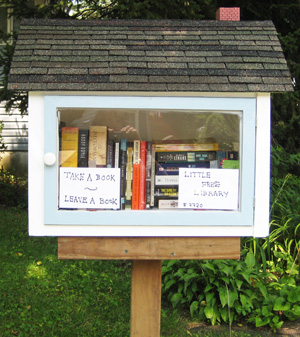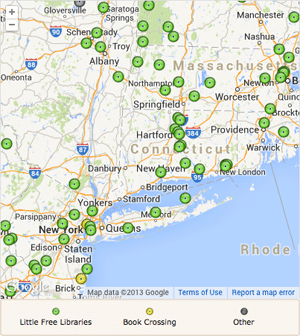
LT members who’ve been around for a year or so may remember our partnership with Books Matter, an organization dedicated to providing books to needy schools in Ghana. I caught up with Keith Goddard—founder of Books Matter—this week, who was kind enough to update me on their latest projects!
Interested in donating to Books Matter? Drop me a line at loranne@librarything.com to donate books, or visit their website for monetary donations.
Can you tell us a bit about how Books Matter got started?
Basically, three things happened. First, my wife was sending some items to Ghana (that’s where she’s from) and she suggested we send some books and other things that my kids no longer used. The second thing is that she had always told me that many school in Ghana have no books. That really shocked and amazed me. The third thing is that I am a teacher in the Toronto public school system and I noticed that a lot of books are lying around in schools and not being used. So, I gathered up about 800 books and that was the start.
What is the process involved in getting a shipment of books sent? How many books can you send to Ghana at once?
We don’t have a lot of room at our house, which is where we store the books. Once we get to about 2,000 books our sunroom becomes unusable, so we are encourged to clear them out. Then we have to scan them, pack them, and raise enough money to send them. There’s no limit on how many we can send at a time, but due to the storage issue, we think around 2,000 is a good number.
In its first year, Books Matter sent 6,000 books to Ghana. That’s great! Did you anticipate that you’d have this much success?
I didn’t really know what to expect. Sometimes I think 6,000 is great and other days I feel that it’s nothing. I wish we could help meore people, but that being said, I know that the people we have helped are appreciative.
How many schools/libraries have received books from Books Matter now, and where are they? (Click map to enlarge)
 So far, five institutions have received books from us: Bright Future School, in Keta; a library in Keta; a college in Ho; an elementary/junior high near Ho; and, an orphanage near Kumasi.
So far, five institutions have received books from us: Bright Future School, in Keta; a library in Keta; a college in Ho; an elementary/junior high near Ho; and, an orphanage near Kumasi.
You recently ran an Indiegogo campaign, and set out to get another 2,000 books sent. Have those reached their destination(s)? Will you be running another Indiegogo campaign any time soon?
We ran an Indiegogo campaign just before the New Year, and with that money we shipped 1,700 books to five schools, two of which have separate buildings for the junior high and elementary schools, but on the same land. So, those books were cataloged into separate libraries. So, it’s five schools, but seven libraries. I hope that makes sense. Those books should arrive in late April. Since then we’ve received more books and would like to send about 1,500 in April. We’ve packed about 1,000 and scanned about 700. We scan the books we send to most of our recipients, but not all. Probably over 80%.
What are some of your and/or the students’ favorite books that Books Matter has sent?
We’ve sent some great books so far, but I hope we can get more book donations, from publishers, once we are an official charity. One thing that is difficult to do, but that I want to do, is get more feedback from the students about the books and their reading
habits, and how those habits are (hopefully) changing. I’d probably have to check some of the catalogs on LT to remember what we’ve sent! Good thing I cataloged them. We’ve sent a lot of great science and non-fiction picture books, fact books, and there are very few books like that in most Ghana schools. I think those will have a big impact on a lot of younger kids, even if they are reluctant readers, because the topics are so diverse and often relevant. We also sent a first edition And to Think That I Saw It on Mulberry Street… lots of Dr. Seuss. It would be wonderful if any LT members thought there were certain must-have books for youngsters, that they wanted to donate, and maybe write a litte note in the front; they would just have to ship it to us in Toronto.(1)
What’s your personal library like? What sorts of books can be found on your shelves?
My personal library is really nothing to talk about… a fair number of biographies/memoirs about people in developing countries overcoming extreme adversity. Lots of non-fiction.
What have you read and enjoyed lately?
I like having about five books on the go at once, partly because I have trouble sticking with things sometimes! Also, because I enjoy such a wide variety and that’s the big reason I think kids should have a lot of books at their disposal to check out and become interested by. Having an e-reader is great, but that’s different than browsing through shelves of books, and touching them and flipping through them. That’s how kids catch the reading spark. That, and being read to. I just finished 12 Years a Slave and am now reading a modern day slavery account, called Slave by Mende Nazer and Damien Lewis. I’m also reading a book on how to use YouTube for marketing.
What’s next for Books Matter? Do you have the next milestone, upcoming projects/shipments, etc. in mind?
 We’ve always got shipments in mind. We’d like to hear from some of the schools where we’ve donated and make subsequent donations based on their likes and needs. I would love to go back to Ghana sometime in the future and oberve the kids, talk to them about reading, read with them, and talk to the teachers about reading/teaching strategies. It would be great to give more support than just putting the books in front of people. That’s not always enough, especially if they haven’t already developed the reading bug. That’s why sending the picture books and easy readers for the very young children is so important.
We’ve always got shipments in mind. We’d like to hear from some of the schools where we’ve donated and make subsequent donations based on their likes and needs. I would love to go back to Ghana sometime in the future and oberve the kids, talk to them about reading, read with them, and talk to the teachers about reading/teaching strategies. It would be great to give more support than just putting the books in front of people. That’s not always enough, especially if they haven’t already developed the reading bug. That’s why sending the picture books and easy readers for the very young children is so important.
I’d like to thank Keith for taking the time to chat with me! Books Matter is doing excellent work, and it’s a joy to work with them!
—interview by Loranne Nasir
1. As mentioned above, if you have books you’d like to send to Books Matter, be sure to send Loranne an email (loranne@librarything.com).











